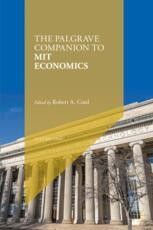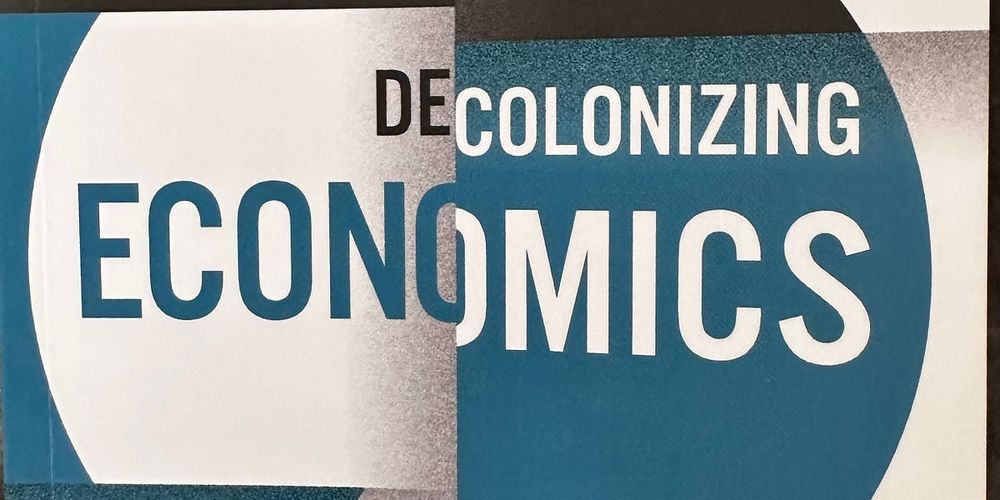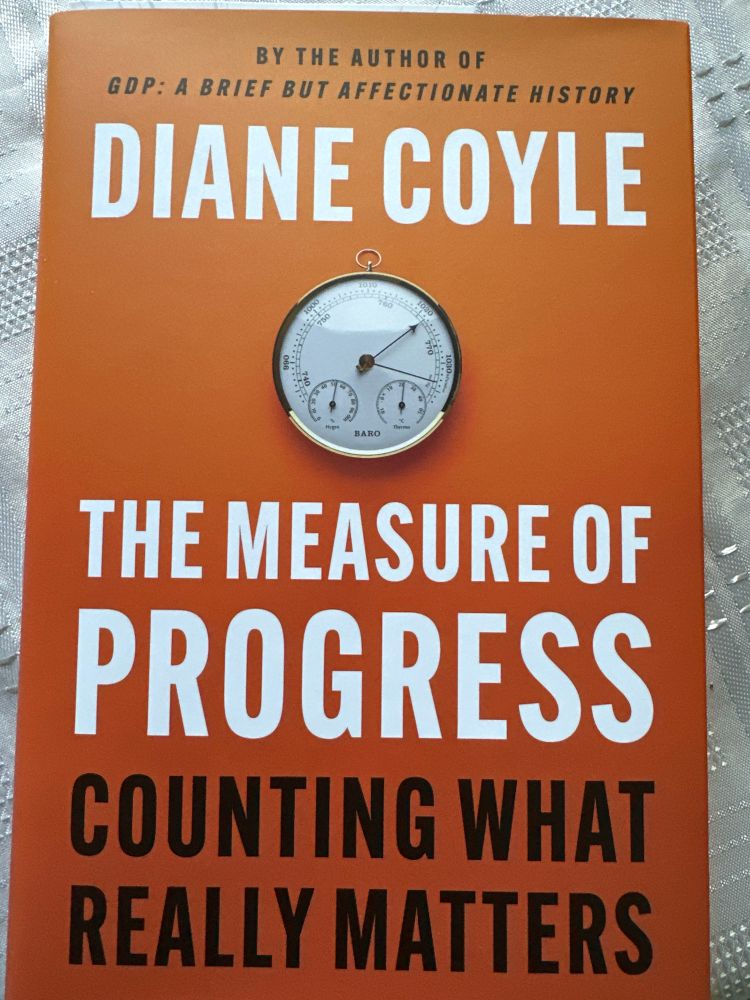
Robert Bigg
@robertbigg.bsky.social
History of Economics; Information Systems &c. Still looking through post-Keynesian tinted glasses: we have been seduced by the maths not convinced by the poets.
Currently working on Alvin Hansen, Sidney Alexander, & Theodor Gregory.
https://rbigg.github.io
Currently working on Alvin Hansen, Sidney Alexander, & Theodor Gregory.
https://rbigg.github.io
This looks interesting - a Palgrave Macmillan lecture on decolonisation with @nakedkeynes.bsky.social Esteban Pérez Caldentey, @jayatighosh.bsky.social & Wyndham Hacket Pain
cassyni.com/events/GFrm3...
cassyni.com/events/GFrm3...
Cassyni | Science starts with a seminar
Seamlessly organise, run and publish academic research seminars. Get started in minutes.
cassyni.com
November 7, 2025 at 1:18 PM
This looks interesting - a Palgrave Macmillan lecture on decolonisation with @nakedkeynes.bsky.social Esteban Pérez Caldentey, @jayatighosh.bsky.social & Wyndham Hacket Pain
cassyni.com/events/GFrm3...
cassyni.com/events/GFrm3...
@cacrisalves.bsky.social Hi, at my suggestion, Bob Cord has been trying to reach you… maybe his email ended up in spam?
September 24, 2025 at 12:23 PM
@cacrisalves.bsky.social Hi, at my suggestion, Bob Cord has been trying to reach you… maybe his email ended up in spam?
Reading the latest @resmedia.bsky.social newsletter I am encouraged that there seems to be a growing argument about narratives, in-between methods, radical uncertainty etc. that move, if not away from, then at least, wider than formal models.
August 9, 2025 at 6:01 PM
Reading the latest @resmedia.bsky.social newsletter I am encouraged that there seems to be a growing argument about narratives, in-between methods, radical uncertainty etc. that move, if not away from, then at least, wider than formal models.
And many economists appear to actively ignore past theories - the latest version must surely either incorporate or supersede how the subject was approached before. It seems to lead more to reinvention than reappraisal.
This is true of most other social sciences. They rarely have a good historical grasp of their research topic and it shows.
July 27, 2025 at 7:29 PM
And many economists appear to actively ignore past theories - the latest version must surely either incorporate or supersede how the subject was approached before. It seems to lead more to reinvention than reappraisal.
Harald Jähner’s ‘Vertigo’ on Weimar Germany does exactly that to great effect.
History should regard literature as source not just in terms of deducing information but as a window into atmospheres and ambiances
July 27, 2025 at 7:18 PM
Harald Jähner’s ‘Vertigo’ on Weimar Germany does exactly that to great effect.
Very pleased to say that my chapter on Sidney Alexander for the Palgrave volume on MIT Economics is finally out!
link.springer.com/book/10.1007...
link.springer.com/book/10.1007...

The Palgrave Companion to MIT Economics
This book offers a comprehensive history of economics at MIT, highlighting the key figures from the department.
link.springer.com
July 13, 2025 at 7:50 AM
Very pleased to say that my chapter on Sidney Alexander for the Palgrave volume on MIT Economics is finally out!
link.springer.com/book/10.1007...
link.springer.com/book/10.1007...
Some thoughts on reading ‘Decolonizing Economics’ by @devikadutt.bsky.social @cacrisalves.bsky.social @surbhikesar.bsky.social @ingridhk.bsky.social
open.substack.com/pub/robertbi...
open.substack.com/pub/robertbi...

Reorienting the Economic Debate
Thoughts on ‘Decolonizing Economics’ by Dutt, Alves, Kesar, & Kvangraven. This is a significant book, despite what, for some, might be a forbidding title. It is not always comfortable reading, it can ...
open.substack.com
July 11, 2025 at 12:06 PM
Some thoughts on reading ‘Decolonizing Economics’ by @devikadutt.bsky.social @cacrisalves.bsky.social @surbhikesar.bsky.social @ingridhk.bsky.social
open.substack.com/pub/robertbi...
open.substack.com/pub/robertbi...
Indeed!
My latest, on how the government is in a brilliant position to make big decisions, if only it can stop thinking small.

Welfare and the unexpected tyranny of government statistics
How the government’s obsession with tiny numbers has crippled decision making (and undermined the ONS).
martinrobbins.substack.com
July 10, 2025 at 5:31 PM
Indeed!
I was most impressed by this book when I read it, and this review confirms that. “A more speculative argument is that Hodgson’s institutionalism may represent a new … perspective ... Hodgson proposes a new form of institutional economics that has reached a wide audience”
A review of Geoffrey Hodgson's book (The Wealth of a Nation: Institutional Foundations of English Capitalism), by Felipe Almeida
doi.org/10.1017/S105...
doi.org/10.1017/S105...

June 26, 2025 at 6:43 PM
I was most impressed by this book when I read it, and this review confirms that. “A more speculative argument is that Hodgson’s institutionalism may represent a new … perspective ... Hodgson proposes a new form of institutional economics that has reached a wide audience”
Reposted by Robert Bigg
It is with great sadness that we have learned of the death of Mr James (Jim) Trevithick, who was an academic in the Faculty from 1976 to 2002.
Jim was interested in macroeconomic issues such as inflation and unemployment.
www.econ.cam.ac.uk/news/2025/re...
Jim was interested in macroeconomic issues such as inflation and unemployment.
www.econ.cam.ac.uk/news/2025/re...

June 5, 2025 at 12:39 PM
It is with great sadness that we have learned of the death of Mr James (Jim) Trevithick, who was an academic in the Faculty from 1976 to 2002.
Jim was interested in macroeconomic issues such as inflation and unemployment.
www.econ.cam.ac.uk/news/2025/re...
Jim was interested in macroeconomic issues such as inflation and unemployment.
www.econ.cam.ac.uk/news/2025/re...
Sadly Jim Trevithick passed away at the end of May. He helped bounce some ideas around from an undergraduate essay & later became my PhD supervisor as the work developed. His lectures on money & macroeconomic teaching in general will be remembered fondly by many.
www.kings.cam.ac.uk/news/2025/ja...
www.kings.cam.ac.uk/news/2025/ja...

James Trevithick (1945-2025)
Jim joined King’s as a Fellow in Economics 1977. He studied at the London School of Economics obtaining a B.Sc. and M.Sc. in Economics. He came to Cambridge in 1976 as an Assistant Lecturer in the Fac...
www.kings.cam.ac.uk
June 24, 2025 at 7:35 AM
Sadly Jim Trevithick passed away at the end of May. He helped bounce some ideas around from an undergraduate essay & later became my PhD supervisor as the work developed. His lectures on money & macroeconomic teaching in general will be remembered fondly by many.
www.kings.cam.ac.uk/news/2025/ja...
www.kings.cam.ac.uk/news/2025/ja...
Absolutely, it is the process of gathering/understanding the information which results both in the written essay and the analytical building blocks to a knowledge that can be used elsewhere - initially in the subsequent exam - where the questions will be different. AI destroys that learning process.
June 12, 2025 at 11:18 AM
Absolutely, it is the process of gathering/understanding the information which results both in the written essay and the analytical building blocks to a knowledge that can be used elsewhere - initially in the subsequent exam - where the questions will be different. AI destroys that learning process.
Some great, quite philosophical, questions here about the nature of equilibrium and the homogeneity of capital and labour. Plus the breadth of the subjects. Would definitely have gone for Q5…
#EconSky There was a question about "the so-called Cobb-Douglas production function". You also had to know something about Ricardo, Malthus, and Marx. www.irwincollier.com/harvard-grad...

Harvard. Graduate Economic Theory Exam. November 1960 - Economics in the Rear-View Mirror
Questions for the graduate written examination in economic theory at Harvard from November 1960
www.irwincollier.com
June 5, 2025 at 8:43 AM
Some great, quite philosophical, questions here about the nature of equilibrium and the homogeneity of capital and labour. Plus the breadth of the subjects. Would definitely have gone for Q5…
JL Borges once commented that we choose/create our own precursors. Equally important is what we miss out, as Marshall pointed out in his 1885 inaugural lecture about letting ‘the facts’ speak for themselves is “the part … played … in selecting and grouping them” This from ‘Decolonizing Economics’
Great point - what we miss out is as important as what we include in our narrative: “The silence gets weaved into… our very framework of knowledge…[t]his omission restricts enquiry and overlooks alternative approaches, transforming … the development of capitalism into stories of universal progress”
May 25, 2025 at 8:40 PM
JL Borges once commented that we choose/create our own precursors. Equally important is what we miss out, as Marshall pointed out in his 1885 inaugural lecture about letting ‘the facts’ speak for themselves is “the part … played … in selecting and grouping them” This from ‘Decolonizing Economics’
This week’s interesting titles!
Leigh’s short history is a great intro: putting the econ into an historical, social, institutional, & technological setting. Whereas Decolonizing Econ seeks to challenge our whole Eurocentric approach. They have an element of a return to political economy in common.
Leigh’s short history is a great intro: putting the econ into an historical, social, institutional, & technological setting. Whereas Decolonizing Econ seeks to challenge our whole Eurocentric approach. They have an element of a return to political economy in common.

May 24, 2025 at 11:17 AM
This week’s interesting titles!
Leigh’s short history is a great intro: putting the econ into an historical, social, institutional, & technological setting. Whereas Decolonizing Econ seeks to challenge our whole Eurocentric approach. They have an element of a return to political economy in common.
Leigh’s short history is a great intro: putting the econ into an historical, social, institutional, & technological setting. Whereas Decolonizing Econ seeks to challenge our whole Eurocentric approach. They have an element of a return to political economy in common.
Sidney Alexander’s 1951 IMF Staff Paper 'Devaluation Versus Import Restrictions as an Instrument for
Improving Foreign Trade Balance' and its 1952 follow up 'Effects of a Devaluation on a Trade Balance' are interesting in this regard. How resources/spending must be switched to vary imports/exports.
Improving Foreign Trade Balance' and its 1952 follow up 'Effects of a Devaluation on a Trade Balance' are interesting in this regard. How resources/spending must be switched to vary imports/exports.
One of the many things Donald Trump doesn't know is that a tax on imports is a tax on exports. on.ft.com/3ZaUjUj

Donald Trump’s tariffs will boomerang on US exporters
[FREE TO READ] A tax on imports is a tax on exports
on.ft.com
May 8, 2025 at 12:48 PM
Sidney Alexander’s 1951 IMF Staff Paper 'Devaluation Versus Import Restrictions as an Instrument for
Improving Foreign Trade Balance' and its 1952 follow up 'Effects of a Devaluation on a Trade Balance' are interesting in this regard. How resources/spending must be switched to vary imports/exports.
Improving Foreign Trade Balance' and its 1952 follow up 'Effects of a Devaluation on a Trade Balance' are interesting in this regard. How resources/spending must be switched to vary imports/exports.
This is an extremely valuable and interesting resource as well as a huge achievement!
#EconSky Ten years ago today Economics in the Rear-view Mirror was launched. Since then 1,860 archival artifacts have been transcribed, annotated and posted--an average flow of one new artifact every other day for a decade! Thanks to all those who have visited the blog www.irwincollier.com

May 8, 2025 at 12:17 PM
This is an extremely valuable and interesting resource as well as a huge achievement!
There is also a tantalising story of Sidney Alexander who had returned to Harvard, after his wartime OSS work, as an assistant professor from 1946. Instead of this mooted promotion he joined the IMF in 1949 where he developed the absorption approach to the balance of payments.
#EconSky A report for the Harvard economics department regarding the replacement of eight senior professors who were scheduled to retire 1948-1958. See how Arthur Smithies and Paul Samuelson were comparatively seen by the committee. www.irwincollier.com/harvard-repo...

May 4, 2025 at 8:38 PM
There is also a tantalising story of Sidney Alexander who had returned to Harvard, after his wartime OSS work, as an assistant professor from 1946. Instead of this mooted promotion he joined the IMF in 1949 where he developed the absorption approach to the balance of payments.
Reposted by Robert Bigg
PS when it comes to quality of work I am quite confident in saying that widespread outsourcing and casualisation have been far more damaging than globalisation. And not to be confused. But then that would require a serious debate and potentially changing something.
April 6, 2025 at 7:23 PM
PS when it comes to quality of work I am quite confident in saying that widespread outsourcing and casualisation have been far more damaging than globalisation. And not to be confused. But then that would require a serious debate and potentially changing something.
Back where we had our wedding reception 40 years ago… changed a bit since!!

March 30, 2025 at 7:27 PM
Back where we had our wedding reception 40 years ago… changed a bit since!!
A great overview by @mazzucatom.bsky.social “we cannot cut our way to growth”
‘[S]hifting from a mindset which asks, “what can we afford to spend?” to “what does Britain need to thrive in the 21st century, & what are the structures, financing & tools that we need’
open.substack.com/pub/marianam...
‘[S]hifting from a mindset which asks, “what can we afford to spend?” to “what does Britain need to thrive in the 21st century, & what are the structures, financing & tools that we need’
open.substack.com/pub/marianam...

Autumn and Spring Budget Letters: fiscal rules and resisting austerity
Yesterday the UK’s Chancellor of the Exchequer, Rachel Reeves, delivered her Spring Statement to Parliament, signaling a government that is currently stuck between a rock and a hard place.
open.substack.com
March 27, 2025 at 3:24 PM
A great overview by @mazzucatom.bsky.social “we cannot cut our way to growth”
‘[S]hifting from a mindset which asks, “what can we afford to spend?” to “what does Britain need to thrive in the 21st century, & what are the structures, financing & tools that we need’
open.substack.com/pub/marianam...
‘[S]hifting from a mindset which asks, “what can we afford to spend?” to “what does Britain need to thrive in the 21st century, & what are the structures, financing & tools that we need’
open.substack.com/pub/marianam...
Looking forward to getting further into this book by @dianecoyle1859.bsky.social
Encouraged by the introduction including “What does ‘better’ mean?” (NB in 1957 Hansen would have already included nutrition, health, education, recreation…) and “The fundamental issue is the definition of value”.
Encouraged by the introduction including “What does ‘better’ mean?” (NB in 1957 Hansen would have already included nutrition, health, education, recreation…) and “The fundamental issue is the definition of value”.

March 15, 2025 at 2:17 PM
Looking forward to getting further into this book by @dianecoyle1859.bsky.social
Encouraged by the introduction including “What does ‘better’ mean?” (NB in 1957 Hansen would have already included nutrition, health, education, recreation…) and “The fundamental issue is the definition of value”.
Encouraged by the introduction including “What does ‘better’ mean?” (NB in 1957 Hansen would have already included nutrition, health, education, recreation…) and “The fundamental issue is the definition of value”.
This, I would suggest, is particularly true of economics which turned to increasing mathematisation in pursuit of a more scientific method but which helped obscure those value-based assumptions. In doing so we largely lost the poets and philosophers once amongst us.
I'd put it the other way round. Scientific method, as a human practice, is intrinsically value laden. What you choose to investigate, what you decide to measure, how you measure, what you ignore, how you deal with uncomfortable results, even who you allow to do it, are all soaked in values.
Scientific method may be as close to value free as any human activity but scientists have values, foibles and favourites, and are often funded by companies or governments which most certainly are not.
March 15, 2025 at 10:40 AM
This, I would suggest, is particularly true of economics which turned to increasing mathematisation in pursuit of a more scientific method but which helped obscure those value-based assumptions. In doing so we largely lost the poets and philosophers once amongst us.
A welcome addition… consider following if not joining!
PKES is on BlueSky!
The 2025 PKES Summer School in Post-Keynesian Economics and Political Economy is open for registration!
June 22–June 25, University of Greenwich.
Places are available both with and without accommodation, starting at £40.
postkeynesian.net/event/2025-p...
June 22–June 25, University of Greenwich.
Places are available both with and without accommodation, starting at £40.
postkeynesian.net/event/2025-p...
March 14, 2025 at 8:47 AM
A welcome addition… consider following if not joining!
Reposted by Robert Bigg
Calling something “military Keynesianism” suggests a deep misunderstanding of Keynes’ economic thinking in general and his views of financing the cost of the Second World War in particular Short 🧵 www.theguardian.com/business/202...

‘Military Keynesianism’? Reeves faces British defence dilemma after EU spending surge
Even Berlin and Brussels are bending fiscal rules in the face of Russia’s threat. Will the chancellor still stick to hers?
www.theguardian.com
March 9, 2025 at 11:17 AM
Calling something “military Keynesianism” suggests a deep misunderstanding of Keynes’ economic thinking in general and his views of financing the cost of the Second World War in particular Short 🧵 www.theguardian.com/business/202...

